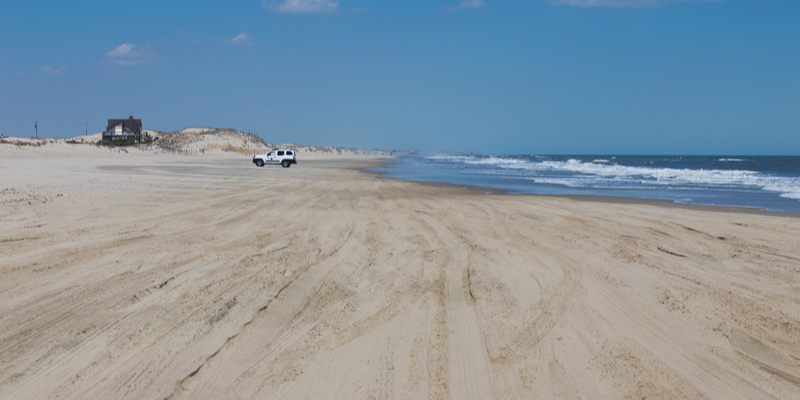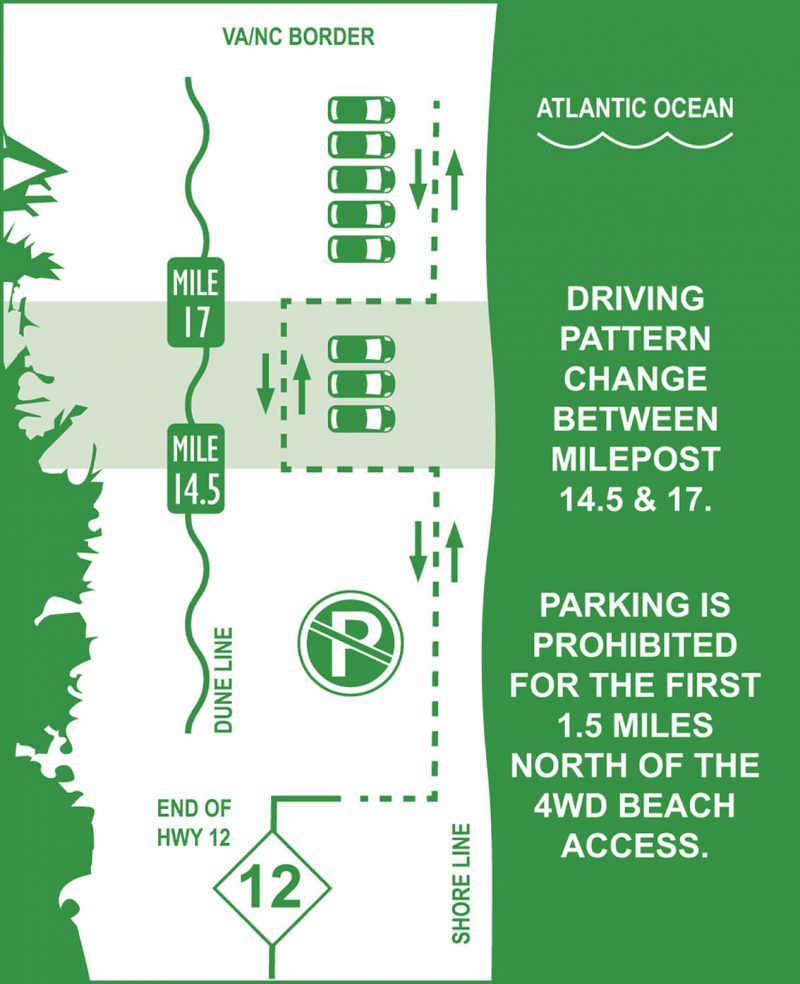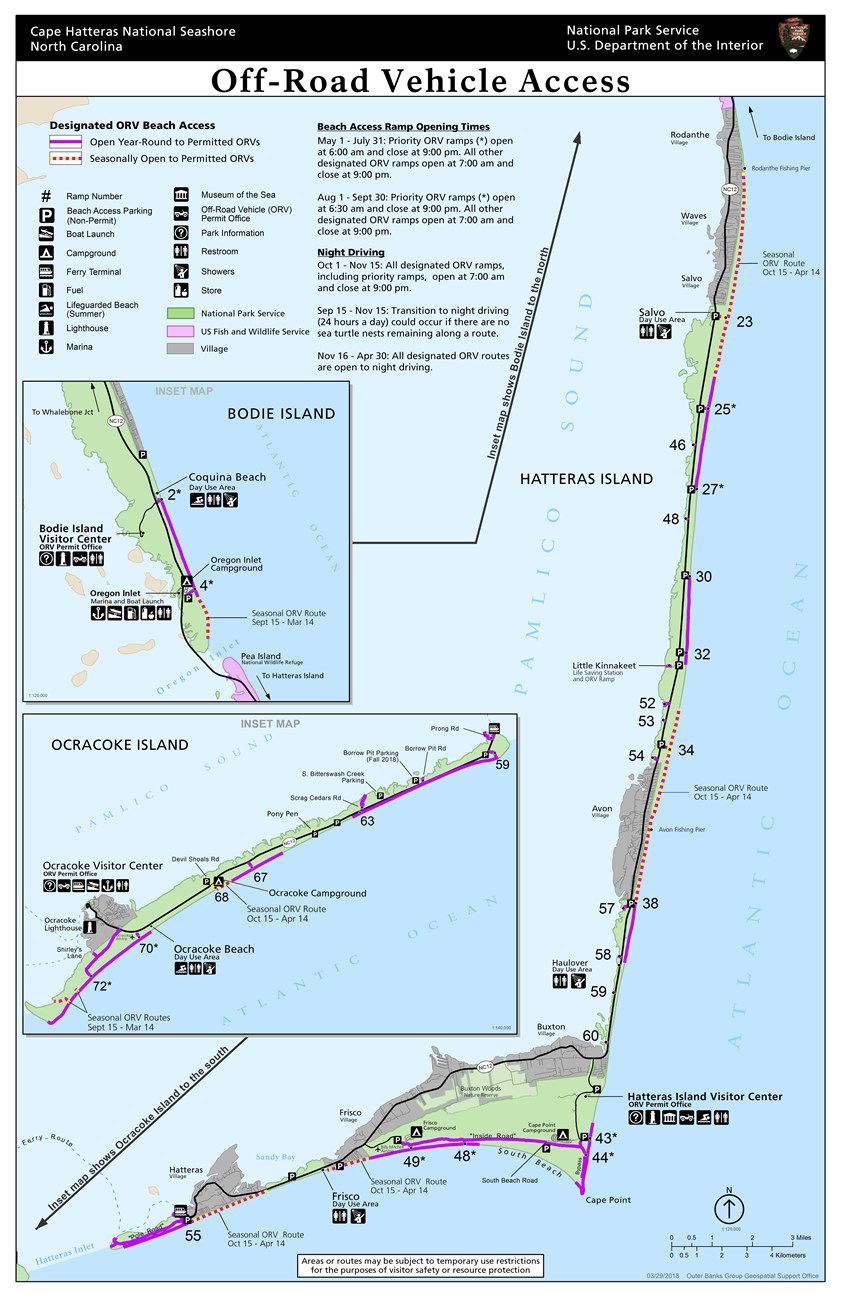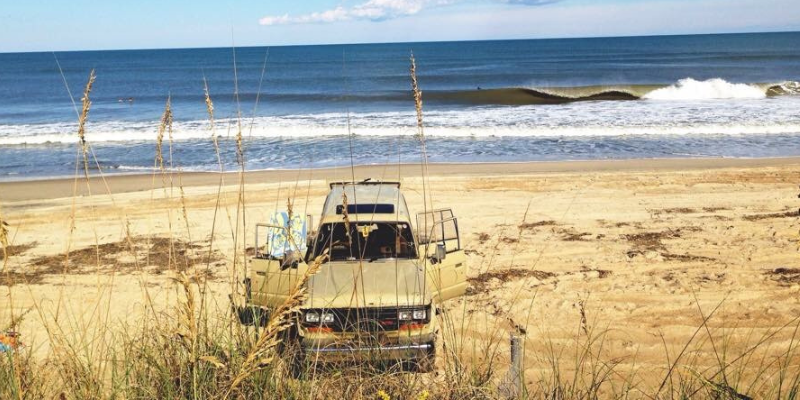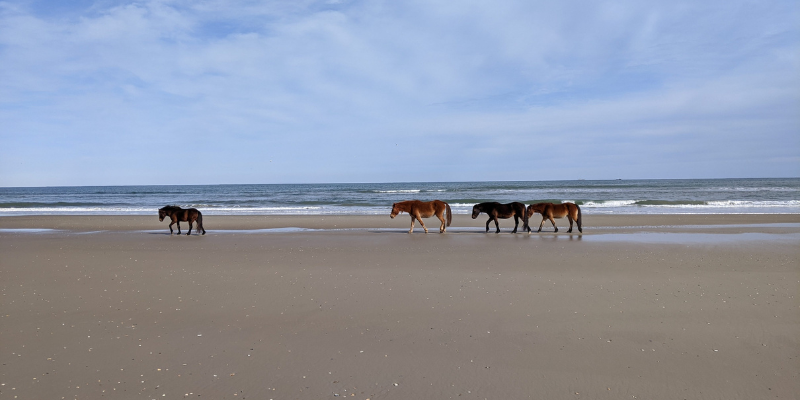Outer Banks Beach Driving
One of the best things about visiting the Outer Banks is the ability to drive your Off-Road Vehicle (ORV) directly on the beach in many places. However, it’s important to keep in mind that driving on the sand is very different from driving on payment. There are many important things to know and prepare for before you decide to take your 4-Wheel Drive (4WD) vehicle off the road and onto the beach.
We want your vacation experience to be the very best and so we at Seaside Vacations are here to help. Keep reading to learn when and where you can take your 4WD vehicle off-road on the Outer Banks. This includes what kind of permits you need and where to find them as well as the rules, regulations, and additional tips for ensuring that your 4WD experience on the Outer Banks is fun and safe.
What Beaches On The Outer Banks Can You Drive On?
As you’re planning your ultimate off-roading adventure, keep in mind that not every town on the Outer Banks permits driving on the beach. Here is a list of beach driving regulations by location.
Currituck Beaches: This includes Corolla and Carova. Driving directly on the beach is permitted. Vehicles MUST have a county-issued Beach Parking Permit properly displayed to park on the beach from the last Saturday in April through the First Saturday in October. More information on permits below.
Duck: The town of Duck does NOT permit driving on the beach at any point during the year.
Southern Shores: The town of Southern Shores does NOT permit driving on the beach at any point during the year.
Kitty Hawk: The town of Kitty Hawk does NOT permit driving on the beach at any point during the year.
Kill Devil Hills: Kill Devil Hills permits driving on the beach ONLY during the OFF-SEASON. Beach driving season is expected to run from October 1st through April 30th, provided that you have obtained a beach driving permit through the town of Kill Devil Hills. Please check here for current information.
Nags Head: Nags Head permits driving on the beach ONLY during the OFF-SEASON. Beach driving season is expected to run from October 1st through April 30th. Driving times are thirty minutes prior to sunrise through thirty minutes after sunset daily. A permit IS REQUIRED and be purchased online, at Nags Head local tackle shops, or at Nags Head Town Hall. Please note: Town of Nags Head Beach Driving Permits are NOT valid on Kill Devil Hills beaches or National Park Beach areas. Please check here for current information.
Cape Hatteras National Seashore: This includes Rodanthe, Waves, Salvo, Avon, Buxton, Frisco, Hatteras, and Ocracoke. The National Park Service manages the use of ORVs in this area and WILL require a permit. A complete list of ramp locations and openings can be found here: https://www.nps.gov/caha/planyourvisit/conditions.htm.
How To Get An Off-Road Vehicle (ORV) Permit
When planning to take your ORV onto the beach, each location has a different requirement for when and how you need to have a permit to drive on the sand. Here is a list of requirements and how to obtain an ORV Permit for each location.
Currituck Beaches (Corolla/Carova): There are currently no restrictions on beach driving in these areas. Vehicles are required to use driving lands adjacent to the dune line between MP 14.5 and MP 17 from 9:00 a.m. until 5:00 p.m. from the Friday before Memorial Day through Labor Day. All other times, drivers should use the driving lanes adjacent to the dune line or at the shoreline. Vehicles MUST have a county-issued Beach Parking Permit properly displayed to park on the beach from the last Saturday in April through the first Saturday in October. If you are renting the 4-Wheel drive area, 2 parking permits should be provided. Visitors NOT renting in the 4-Wheel Drive Area may purchase a weekly Beach Parking Permit for $50 each through the county website here.
Kill Devil Hills/Nags Head: Beach driving is allowed on Kill Devil Hills and Nags Head beaches from October 1st through April 30th with the appropriate beach driving permit. Through a reciprocal program, both the Town of Kill Devil Hills and the Town of Nags Head recognize a beach driving permit issued by either town, meaning you will only need to purchase one permit for both locations. To apply for a beach driving permit in the Town of Kill Devil Hills, applicants will need to visit the Finance Department cashier’s county, located on the second floor of Kitty Hawk Town Hall. More information can be found here. In Nags Head, permits can be obtained at Nags Head Town Hall and Nags Head tackle shops. Find more information here.
Cape Hatteras National Seashore: To obtain an ORV permit for the Cape Hatteras National Seashore, which includes Rodanthe, Waves, Salvo, Avon, Buxton, Frisco, Hatteras, and Ocracoke, they can be purchased online 24 hours a day at https://www.recreation.gov/vehiclepermits/249978. Permits can only be purchased online by filling out an online application. Visitors can purchase a 10-Permit for $50 or an Annual Permit for $120, which is valid for one year from the date of purchase. For more information, please visit the NPS website here.
Where on the Outer Banks Beaches Can You Park Your 4WD Vehicle?
In Corolla/Carova, please adhere to the following map from Currituck County.
Parking is prohibited for the first 1.5 miles North of the 4WD Beach Access and parking permits are quired from the Friday before Memorial Day through Labor Day.
For the Cape Hatteras National Seashore, consult an ORV route map, which can be found at any park visitor center or any Outer Banks Visitors Bureau welcome center.
Please do NOT stop in any of the ramp areas. Park as close to the middle of the beach as you can, east of the dunes, so as not to interfere with beach traffic.
Tips for Driving on the Beach
Taking your vehicle out onto the beach can be one of the most fun things about an Outer Banks vacation. However, before taking your vehicle out for some off-roading adventures, there are several things to keep in mind to make sure that you have the best experience possible.
Only Use a Vehicle with 4-Wheel Drive
Driving on the beach can be a memorable experience, but please to keep those memories pleasant for everyone, only drive on the sand with a vehicle that is equipped with 4WD and please use 4WD when entering the ramp. If your vehicle is not equipped with 4WD, please do not attempt to drive on the beach unless you are confident that your vehicle is capable of off-roading in deep, soft sand.
Air Down Your Tires
You will need some slack in your tires before heading off road, so make sure to air them down before hitting the sand. It is recommended to decrease tire air pressure to 15 - 22 PSI, depending on beach conditions.
*NOTE: Please do NOT air down/up or leave your vehicle in the NC Coastal Estuarine Reserve parking lot in Corolla. Instead, please use one the Corolla beach access lots or the Historic Corolla Park lot.
Be Aware of the Tides
The hard, packed-in sand near the high tide line will be the easiest to drive through and it’s best to drive on the beach within two hours of low tide. Check the tides at NOAA.gov or any local newspaper or radio station to find updated tide times to ensure that rising water doesn’t creep up on you unexpectedly while driving or while parked.
Watch Your Speed
The speed limit on park beaches is 15mph, unless otherwise posted. Please keep this in mind to ensure your safety as well as the safety of everyone else around you.
Stay in the Tracks
Once on the beach, it is best, if possible, to stick to the established sand tracks that run along the high tide line. These tracks form a hard-packed route from other daily drivers. You’ll notice there are two sets of tracks along the shoreline. Just follow these like those on a regular road and you’ll be good to go! Unlike the regular road, just try not to pass other drivers!
Wash Down Your Vehicle
When you’ve completed a fantastic day of off-roading, please make sure to spray your undercarriage once you’ve made it off the beach. Driving along the ocean wash will splash saltwater into the undercarriage of your vehicle, which can result in potential mechanical problems in the future.
Air Up When You’re Finished
Don’t forget to use one of the many available gas station parking lots to refill your tires after getting back onto the road.
Beach Driving Equipment
Before taking your Off-Road Vehicle out onto the beach, the National Park Service advises you to bring along the following required equipment:
A low-pressure tire gauge
A shovel
A jack
A jack support band
The National Park Service also suggests bringing along the following recommended items:
A tow strap
A first aid kit
A full-sized spare tire
Trash bags
A fire extinguisher
A flashlight (especially if night driving)
Driving In Corolla Around The Wild Horses
When driving on the Outer Banks beaches, particularly the northern beaches (Corolla, Carova), please be mindful of any wild horses you may encounter. These free-roaming majestic creatures are a major allure and incredible sight for visitors. When driving on the beaches in Corolla and Corova, you must be alert at all times since the horses can dart out from anywhere. Wild horses rest by laying down on the beaches, making it harder for drivers to see them, especially over the dune lines. The speed limit for driving on the beach is 15 MPH and imperative to follow. Please stay alert and follow the regulations mandated by government officials and local authorities.
Visitors are highly encouraged to learn about and witness these historic and majestic marvels in the hopes that preservation and conservation efforts will grow. However, it’s imperative for your safety and the safety of the horses that this is done at a safe distance. Currituck County law addresses human interaction with the wild horses in the Wild Horse Ordinance.
Important items from the ordinance include:
- It shall further be unlawful for any person to lure, attract or entice a wild horse to come within 50 feet of any person or for any person. (Sec. 3-31. – Luring, enticing, seizing)
- It shall be unlawful for any person to molest, torture, torment, cruelly beat, needlessly mutilate or kill, wound, injure, poison or subject to conditions detrimental to its health or general welfare any wild horse within a wild horse sanctuary, or to cause or procure such action. The words "torture" and "torment" shall be held to include every act which causes unjustifiable pain, suffering or death. (Sec. 3-33. – Cruelty)
- It shall be unlawful for any person to feed, ride, pet or approach with the intent to feed, ride or pet any wild horse. (Sec. 3-36. – Feeding, riding and petting prohibited)
These laws are not meant to prevent visitors and locals from enjoying the Banker Mustangs but rather to protect them. With such a small population, even one injury, illness, or death can be very detrimental to the herd. Unfortunately, many visitors do not understand the full extent of their actions by assuming the wild herd enjoys the same treats that a domestic horse would like. Sadly, one treat could easily kill the horse who eats it. Additionally, although they may appear calm and inquisitive, keeping your distance is absolutely necessary, no matter what your experience level is with domestic horses. At the end of the day, the Spanish Banker Mustangs are a feral species meaning they are wild, unpredictable, and potentially dangerous.
To learn more about the majestic wild Outer Banks horses, click here.
4WD Vehicle Rentals
If you are interested in renting a 4-Wheel drive vehicle for off-roading during your stay, here are some local options.
Good Vibrations Beach Rides
Kitty Hawk
Call: (252) 619-7897
Vehicle delivery available.
Island Jeep & Car Rentals
Kill Devil Hills
Call: (252) 441-0771
Hours: Mon-Fri 9AM-4PM, Sat 9AM-12PM
Beach 4x4 Jeep Rentals OBX
Kill Devil Hills
Call: (252) 564-4218
Outer Banks Jeep Rentals
Kill Devil Hills
Call: (252) 715-4400
Hours: Mon-Sat 9AM-5PM
Hattiebuilt Jeep Rentals
Avon
Call: (252) 361-0740
Island Cruisers, Inc.
Salvo
Call: (252) 987-2097
Hours: (In Season) Mon-Sat 9AM-6PM
Fish Tales 4x4’s
Frisco
Call: (252) 357-7121
Frequently Asked Questions
What Do I Do If I Get Stuck In The Sand?
Getting your vehicle stuck in the sand is something to keep in mind when you head out into the 4WD area. Fortunately, there are some things you can do to alleviate the issue as it arises.
-First, make sure you bring the NPS suggested equipment with you BEFORE you go off-roading. Having a shovel, tow rope, and jack can make getting out a little easier.
-Do NOT try to force your way out by accelerating. Spinning your wheels will only bury you deeper into the sand.
-Try digging behind or in front of your tires, depending on where it's deepest. Take your floor mats and put them behind the back tires. Back out slowly to get unstuck.
-If you’re still stuck, try using ocean water to wet the sand around your tires. Once it’s packed in, it should make it easier to drive across.
-If all else fails, there are plenty of towing companies available that station themselves along the beach, ready to get you out of the sand and back to your vacation soon.
For more details and information about what to do if you get stuck, check here and here.
Where Do I Enter and Leave The Beach?
All accessible beaches have designated numbered ramps for entering and leaving the beach. Do not drive or park on the wrack line, which is the line of natural debris left by high tides. Follow the tracks of other vehicles. For more information, please visit The Outer Banks Tourism Authority here.
Who Can Operate An Off-Road Vehicle (ORV)?
All road regulations and laws remain in place while driving on the beach. All vehicles must have a current state-of-origin registration, safety inspection, and valid license plate at all times. All divers must be at least 16 years of age and must possess a valid driver’s license.
Are There Any Specific Permit Requirements For My Vehicle?
Currituck Beaches do not require a driving permit, but do require a parking permit. Vehicles MUST have a county-issued Beach Parking Permit properly displayed to park on the beach from the last Saturday in April through the first Saturday in October. If you are renting the 4-Wheel drive area, 2 parking permits should be provided. Visitors NOT renting in the 4-Wheel Drive Area may purchase a weekly Beach Parking Permit for $50 each through the county website here.
Kill Devils Hills requires a permit for beach driving season. To apply for a beach driving permit in the Town of Kill Devil Hills, applicants will need to visit the Finance Department cashier’s county, located on the second floor of Kitty Hawk Town Hall. More information can be found here.
Nags Head requires a for beach driving season. Permits can be obtained at Nags Head Town Hall, Nags Head tackle shops, and online. Find more information here.
Cape Hatteras National Seashore does require an ORV (off-road vehicle) permit to drive on the beach. More information available here.
I Plan To Rent Or Lease An ORV During My Vacation. How Does The Permit Work With That?
The person that is renting the vehicle should apply for the ORV permit under their name. Some businesses may provide permits with vehicle rental. Be sure to check with your vehicle provider to ensure proper ORV permit laws are being followed. Vehicle operators are ultimately responsible for following all permit regulations.
How Do I Find Out Which Ramps and Routes are Open?
For Cape Hatteras National Seashore, please visit the beach access table web page to view the current status of beach ramps and routes. You can also sign up for beach access text alerts by texting CAHAORV to 333111. For all other areas, please keep up to date with local town hall information to determine off-roading eligibility.
Can I Tow A Boat or Camping Trailer on ORV Routes?
Boats and utility trailers with one or two axles are allowed. Travel or camping trailers are strictly prohibited.
Can I Drive on the Beach at Night?
Currituck Beaches: Yes. After dark, the entire beach, including parking areas, become driving lanes. Please be aware of evening and early morning high-tide times.
Cape Hatteras National Seashore: During the sea turtle nesting season, from May 1 to November 15, driving on the Seashore's beaches is prohibited from 9 p.m. to 7 a.m. Some portions of designated ORV routes may reopen to night driving on September 15 if there are no turtle nests in the area.
Night driving is allowed November 16th to April 30th.

